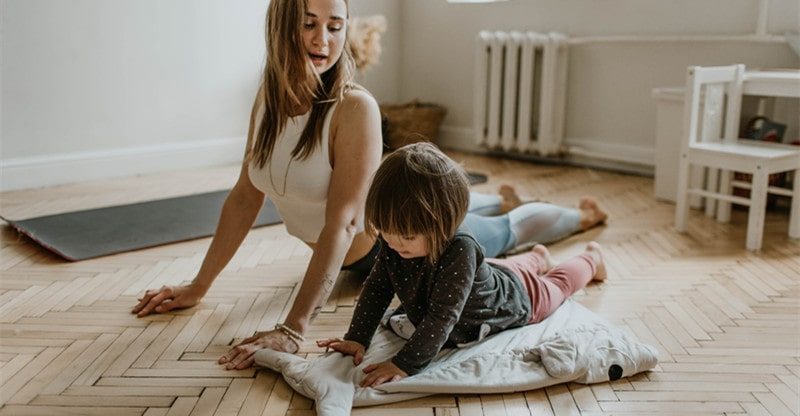6 Activities To Help Young Kids & Toddlers Cope With Divorce
It’s no secret that divorce has an impact on the children involved. The hope is that this impact doesn’t alter their ability to thrive in life.
But unfortunately, research about children of divorced or separated parents indicates that these children are more likely to live in poverty or experience instability in their own families. In addition, kids may experience challenges with their mental and emotional health, including navigating conditions like anxiety and depression.
Thankfully, you can play a significant role in supporting your children throughout a divorce. Although geared toward toddlers and young children, you can adjust these activities to support the mental health of older children too, and ensure they’re coping healthily with the divorce.
Have Meaningful Conversations Regularly
Whether your child is a toddler or a five-year-old, they’re feeling something about the divorce. They’re noticing a shift in their day-to-day life. They’re also noticing the dynamic between you and your former spouse and how one of you isn’t there as much as you used to be. This may be especially apparent as you and your ex are working to make family life comfortable as you move through your divorce proceedings.
The last thing you want is for your children to feel like they have to bottle everything inside. Even toddlers can boil over to the point they start having behavioral problems because they can’t express themselves.
Have meaningful conversations with your children regularly. Help them talk about their feelings and identify what’s hurting and helping them during this time. You could do this by checking in with them every morning or after school, or taking them on outings and having the conversations then.
Toddlers will be limited in what they can say. But be patient and help them flesh out what they’re feeling by asking simple questions that give you a feel for what they’re trying to communicate.
Engage in Sensory Play
Meaningful conversations are great. But you don’t want to live, eat, and breathe divorce. Instead, focus on rebuilding their stability, confidence, and mental health too. Incorporating play into your routine is just one way to ensure that your child is healthy and happy, starting with engaging in sensory play.
Sensory play activities focus on helping your child explore their five senses. Children that engage in sensory play develop new skills, heighten their senses, and uncover new materials, textures, and resources, all while having fun and experiencing happy emotions — both of which they need during this time.
Try these sensory play activities for toddlers and young children:
1. Start a garden;
2. Go puddle jumping;
3. Make frozen water balloons and bubbles;
4. Design an outdoor mud kitchen and make mud art;
5. Engage in messy play with clay, sand, and playdough;
6. Experience new sounds and sights with a disco light and ambient music.
Find more sensory play ideas online and try the ones your children would be most interested in.
Spend More Time Outdoors
The American Psychological Association touches on a growing body of research supporting the wellness benefits of spending time in nature, such as boosted mood, increased happiness, better cognitive function, and reduced risk of developing psychiatric disorders later in life.
Take your toddler or young child outside and spend time with them there often. You can spend more time outdoors doing the following activities:
1. Camping;
2. Gardening;
3. Swimming;
4. Going on picnics;
5. Going on boat rides;
6. Doing nature photography;
7. Trying kayaking or canoeing;
8. Exploring nature trails and hikes;
9. Taking kid-friendly yoga or meditation classes.
There are a whole lot more outdoor activities to choose from. Try as many as possible that are appropriate for your children’s ages and abilities so that they can experience the mental health and wellness benefits that come from spending time outdoors often.
Introduce Art and Other Creative Activities
Expressing oneself creatively is a common way to cope with stressful situations. It may be the avenue your children need to deal with what they’re feeling about the divorce. And if they end up really liking creative expression, they can rely on it to boost their mood whenever they need it.
Set up an art hour every day or dedicate a day or two during the week to creative expression. Introduce various creative activities to your child, like:
1. Writing;
2. Drawing;
3. Sculpting;
4. Cooking;
5. Scrapbooking;
6. Finger painting;
7. Making music;
8. Singing and dancing.
As mentioned above, creative expression can be a way for your children to navigate what they’re experiencing with the divorce. It can also be a way for you to better understand what they’re going through.
Spend Quality One-on-One Time Together
Your relationship with your children will have a lot to do with how well they cope with the divorce. You can help them feel empowered, protected, and confident despite what’s going on around them. But you must continuously develop a genuine, deep relationship with them to have this kind of impact. Spend lots of quality one-on-one time with each of your children.
You already know a lot about what they like to do. Make time for these activities weekly and surprise them with spontaneous outings to keep feeding your bond.
See If You Can Spend Time as a Family
This may not be possible right now, but you should strive to spend time as a family once you’re in a better place with your former spouse. Many children feel like they’re caught in the middle during a divorce. Showing your children that you can all spend time together and that it’s a happy experience helps them to not feel this way.
It’s also important to keep conflict down and make sure that your child is comfortable. If you notice that your child is becoming stressed, take five minutes to ease their anxiety by using management techniques such as deep breathing, stretching, doing positive affirmations, or going on a walk to calm down.
It’s also a good idea to reduce the potential for conflict by being kind and cordial with your ex in these situations. You should always support your children and encourage them to have a good time with their other parent.
Helping young kids and toddlers cope with divorce is critical for their growth and flourishing in adulthood. You can play an important role in supporting your child through this difficult time and providing them with ways to safely express themselves.



